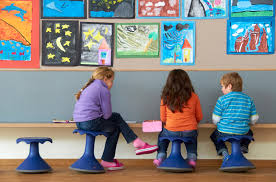
Frustrated, fidgety kids and stressed-out parents are driving many teachers crazy – and they are grasping for life preservers in today’s classrooms. Enter stationary bikes, the latest wave in the North American self-regulation movement.
I must confess, we do have a spin bike or two at the school, and wiggle pads, thera-bands on chair legs, hokki stools, sit balls and even a punching bag! Many of our students have fidgets and we spend a considerable amount of time in our SEL classes working on "zones of regulation" or using strategies such as MindUp to help our kids work on their understanding of self, and regulation of their emotions. These are not "life preservers" but rather pro-active interventions to help our students concentrate more effectively in the classroom and to enhance their interpersonal relationships with their peers.
In actual fact, far from being a New Age gimmick - the importance of self-regulation has been demonstrated in a host of research studies to be a key component of effective executive functioning in students. One 2012 summary of current research states that "the development and effective measurement of behavioural regulation, or “executive function in context,” [has established] that behavioural regulation contributes significant, unique variance to children’s academic achievement and growth trajectories between preschool years, elementary, middle school, and even to high school." In other words, it is an essential component of the student learning process.
Basically the research supports what common sense tells us, namely that strong, negative emotional reactions (often brought about by anxiety or frustration) impede a child's ability to regulate their own behaviour in a classroom setting and will often result in them being unable to concentrate and focus on essential tasks or miss key instructions or verbal cues. Consequently, strategies that help students to manage these strong feelings are bound to have a positive impact on their ability to complete tasks and develop persistence in the face of challenges.
The traditional alternative to self-regulation has been to address the behaviour and not its root cause. Strategies such as "time outs", isolation rooms, staying in at recess, or suspensions/expulsions have proven to be counter-productive. A 2008 study on the impact of dealing with behaviour challenges by the American Psychological Association (APA) concluded that:
Rather than reducing the likelihood of disruption...school suspension in general appears to predict higher future rates of misbehaviour and suspension among those students who are suspended.
In other words, suspending a child simply reinforces the notion that she or he does not belong at school. Rather than feeling remorse about their actions, suspended students feel resentful and angry. The result, as noted above, is that they will act out these emotions at school the next time that they get a chance and become the "chronic behaviour problem" that educators love to complain about.
It is far more productive, and beneficial in the long term, to work on helping students to develop self-regulation strategies that will enable them to break this cycle and have a more productive and successful school experience. If this means a few more spin bikes around the school, it is a small price to pay!


 RSS Feed
RSS Feed
